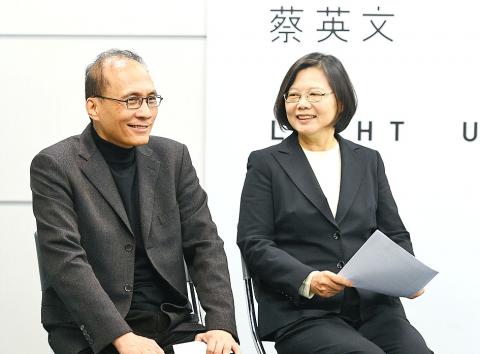Calling him “the best executive,” president-elect Tsai Ing-wen (蔡英文) yesterday named former minister of finance Lin Chuan (林全) as the premier of the Democratic Progressive Party (DPP) administration that is to take office on May 20.
Lin is good at communicating and solving problems, and is also adept at delineating the parameters of a disagreement so that a solution can be found, Tsai said.
Lin is the person most familiar with her plans for governing the nation, and his performance when he was a minister won the approval of the public, Tsai said.

Photo: Chang Chia-ming, Taipei Times
“That was why I chose him as premier,” Tsai said alongside Lin at a press conference held to announce his appointment.
Lin, born in Kaohsiung on Dec. 13, 1951, was chief of the Directorate-General of Budget, Accounting and Statistics of the Executive Yuan between 2000 and 2002, and minister of finance between late 2002 and early 2006 under then-president Chen Shui-bian (陳水扁). He has no party affiliation.
Lin is now the chief executive officer of the New Frontier Foundation, a think tank chaired by Tsai. He played a major role in her presidential campaign.
Although Lin worked exclusively on financial matters when in government, Tsai said: “I promise everyone that Lin Chuan’s Cabinet will not be one focused on economics and finance,” but one of reform, and one that is good at communicating and getting things done.
Tsai said she chose to announce the appointment yesterday because she plans to have the key positions in the new Cabinet selected by next month to give her team enough time to prepare for office.
The nation faces many long-standing problems and challenges, Tsai said, adding that the political and social reforms she pledged are as important to her as economic and industrial policies.
Starting straight away, her team aims to rebuild the public’s trust in the government, Tsai said.
“I believe Lin Chuan will be the best executive for Taiwan as it heads toward reform,” Tsai said.
At the news conference, Lin said he would aim for close communication with local governments and that he hoped to recruit talented officials from local government to help the Cabinet get a grasp of the needs and expectations of the public.
Saying that at first he did not want to return to public life, Lin called on people with experience to “help us in government,” adding that the government must nurture new talent to be sustainable.
Lin has a bachelor’s degree in economics from Fu Jen Catholic University and a master’s degree in public finance from National Chengchi University. He received his doctorate in economics from the University of Illinois, Urbana-Champaign.
He has also served as executive director of Tsai’s Thinking Taiwan Foundation and head of the Taipei City Government’s Department of Finance, and is now a part-time instructor at National Taiwan University’s department of economics.

Intelligence agents have recorded 510,000 instances of “controversial information” being spread online by the Chinese Communist Party (CCP) so far this year, the National Security Bureau (NSB) said in a report yesterday, as it warned of artificial intelligence (AI) being employed to generate destabilizing misinformation. The bureau submitted a written report to the Legislative Yuan in preparation for National Security Bureau Director-General Tsai Ming-yen’s (蔡明彥) appearance before the Foreign Affairs and National Defense Committee today. The CCP has been using cognitive warfare to divide Taiwanese society by commenting on controversial issues such as Taiwan Semiconductor Manufacturing Co’s (TSMC, 台積電) investments in the

HELPING HAND: The steering committee of the National Stabilization Fund is expected to hold a meeting to discuss how and when to utilize the fund to help buffer the sell-off The TAIEX plunged 2,065.87 points, or 9.7 percent, to close at 19,232.35 yesterday, the highest single-day percentage loss on record, as investors braced for US President Donald Trump’s tariffs after an extended holiday weekend. Amid the pessimistic atmosphere, 945 listed companies led by large-cap stocks — including Taiwan Semiconductor Manufacturing Co (TSMC, 台積電), Hon Hai Precision Industry Co (鴻海精密) and Largan Precision Co (大立光) — fell by the daily maximum of 10 percent at the close, Taiwan Stock Exchange data showed. The number of listed companies ending limit-down set a new record, the exchange said. The TAIEX plunged by daily maxiumu in just

‘COMPREHENSIVE PLAN’: Lin Chia-lung said that the government was ready to talk about a variety of issues, including investment in and purchases from the US The National Stabilization Fund (NSF) yesterday announced that it would step in to staunch stock market losses for the ninth time in the nation’s history. An NSF board meeting, originally scheduled for Monday next week, was moved to yesterday after stocks plummeted in the wake of US President Donald Trump’s announcement of 32 percent tariffs on Taiwan on Wednesday last week. Board members voted to support the stock market with the NT$500 billion (US$15.15 billion) fund, with injections of funds to begin as soon as today. The NSF in 2000 injected NT$120 billion to stabilize stocks, the most ever. The lowest amount it

NEGOTIATIONS: Taiwan has good relations with Washington and the outlook for the negotiations looks promising, Minister of Economic Affairs J.W. Kuo said Taiwan’s GDP growth this year is expected to decrease by 0.43 to 1.61 percentage points due to the effects of US tariffs, National Development Council (NDC) Minister Paul Liu (劉鏡清) said at a meeting of the legislature’s Economics Committee in Taipei yesterday, citing a preliminary estimate by a private research institution. Taiwan’s economy would be significantly affected by the 32 percent “reciprocal” tariffs slapped by the US, which took effect yesterday, Liu said, adding that GDP growth could fall below 3 percent and potentially even dip below 2 percent to 1.53 percent this year. The council has commissioned another institution